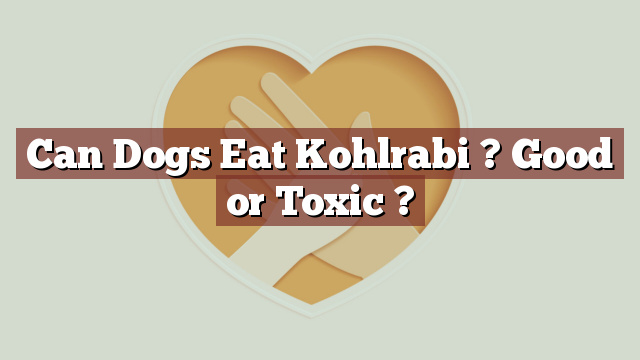Can Dogs Eat Kohlrabi? Good or Toxic?
When it comes to feeding our furry friends, it is essential to know which foods are safe for them to consume. Some human foods can be harmful or toxic to dogs, causing digestive issues, poisoning, or other health problems. One such food that often raises questions is kohlrabi. In this article, we will explore whether dogs can eat kohlrabi and whether it is good or toxic for them.
Nutritional Value of Kohlrabi: What does it offer to dogs?
Kohlrabi, a cruciferous vegetable, is rich in nutrients that can be beneficial for both humans and dogs. It is packed with vitamins such as vitamin C, vitamin B6, and vitamin K. Additionally, kohlrabi contains minerals like potassium and manganese, which are important for maintaining a healthy body. The vegetable also provides dietary fiber, which aids in digestion and helps regulate bowel movements. Furthermore, kohlrabi is low in calories and fat, making it a suitable option for dogs on a weight management diet.
Safety of Kohlrabi for Dogs: Is it Toxic or Safe?
Dogs can safely eat kohlrabi. Unlike certain foods that can be toxic to dogs, such as grapes, chocolate, or onions, kohlrabi does not pose any significant threats to their health. However, it is important to note that while kohlrabi itself is safe, certain preparations or seasonings used with kohlrabi may not be suitable for dogs. For instance, if the kohlrabi is cooked with onions or garlic, it should not be fed to dogs as these ingredients can be toxic to them. It is always best to offer plain, unseasoned kohlrabi to dogs to ensure their safety.
Potential Risks and Benefits of Feeding Kohlrabi to Dogs
When dogs consume kohlrabi in moderation, it can provide several health benefits. The high fiber content in kohlrabi can aid in maintaining a healthy digestive system and prevent constipation. The vitamins present in kohlrabi, especially vitamin C, can support the immune system and contribute to the overall well-being of dogs. Additionally, the low calorie and fat content of kohlrabi make it a suitable choice for dogs who need to shed some pounds or maintain a healthy weight.
However, it is important to be aware of the potential risks associated with feeding dogs too much kohlrabi. Overconsumption of any food, including kohlrabi, can lead to digestive upset, such as diarrhea or gas. It is always recommended to introduce new foods to your dog’s diet gradually and in moderation to prevent any adverse reactions.
What to Do if Your Dog Eats Kohlrabi: First Aid Measures
If your dog accidentally consumes kohlrabi, there is usually no need to panic. However, if you notice any unusual symptoms or if your dog appears to be in distress, it is best to contact your veterinarian for guidance. They will be able to provide the appropriate advice based on your dog’s specific situation. If your dog has eaten kohlrabi in excessive amounts or if any seasoning or ingredient is potentially toxic, it is crucial to seek veterinary assistance immediately.
Conclusion: Can Dogs Eat Kohlrabi? Factors to Consider
In conclusion, dogs can eat kohlrabi without any major risks to their health. This cruciferous vegetable offers a range of nutritional benefits, such as vitamins and minerals, and can be a healthy addition to their diet. However, it is important to remember that moderation is key and to avoid any seasonings or ingredients that are harmful to dogs. If you have any concerns or questions about feeding kohlrabi to your dog, consult with a veterinarian for personalized advice and guidance.
Thank you for investing your time in exploring [page_title] on Can-Eat.org. Our goal is to provide readers like you with thorough and reliable information about various dietary topics. Each article, including [page_title], stems from diligent research and a passion for understanding the nuances of our food choices. We believe that knowledge is a vital step towards making informed and healthy decisions. However, while "[page_title]" sheds light on its specific topic, it's crucial to remember that everyone's body reacts differently to foods and dietary changes. What might be beneficial for one person could have different effects on another. Before you consider integrating suggestions or insights from "[page_title]" into your diet, it's always wise to consult with a nutritionist or healthcare professional. Their specialized knowledge ensures that you're making choices best suited to your individual health needs. As you navigate [page_title], be mindful of potential allergies, intolerances, or unique dietary requirements you may have. No singular article can capture the vast diversity of human health, and individualized guidance is invaluable. The content provided in [page_title] serves as a general guide. It is not, by any means, a substitute for personalized medical or nutritional advice. Your health should always be the top priority, and professional guidance is the best path forward. In your journey towards a balanced and nutritious lifestyle, we hope that [page_title] serves as a helpful stepping stone. Remember, informed decisions lead to healthier outcomes. Thank you for trusting Can-Eat.org. Continue exploring, learning, and prioritizing your health. Cheers to a well-informed and healthier future!

